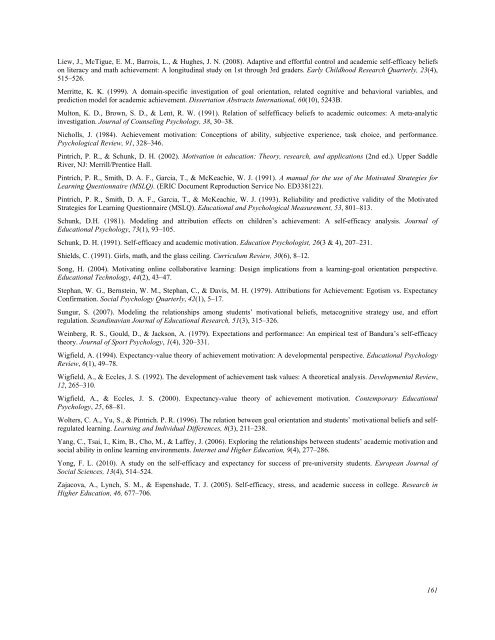January 2012 Volume 15 Number 1 - Educational Technology ...
January 2012 Volume 15 Number 1 - Educational Technology ...
January 2012 Volume 15 Number 1 - Educational Technology ...
You also want an ePaper? Increase the reach of your titles
YUMPU automatically turns print PDFs into web optimized ePapers that Google loves.
Liew, J., McTigue, E. M., Barrois, L., & Hughes, J. N. (2008). Adaptive and effortful control and academic self-efficacy beliefs<br />
on literacy and math achievement: A longitudinal study on 1st through 3rd graders. Early Childhood Research Quarterly, 23(4),<br />
5<strong>15</strong>–526.<br />
Merritte, K. K. (1999). A domain-specific investigation of goal orientation, related cognitive and behavioral variables, and<br />
prediction model for academic achievement. Dissertation Abstracts International, 60(10), 5243B.<br />
Multon, K. D., Brown, S. D., & Lent, R. W. (1991). Relation of selfefficacy beliefs to academic outcomes: A meta-analytic<br />
investigation. Journal of Counseling Psychology, 38, 30–38.<br />
Nicholls, J. (1984). Achievement motivation: Conceptions of ability, subjective experience, task choice, and performance.<br />
Psychological Review, 91, 328–346.<br />
Pintrich, P. R., & Schunk, D. H. (2002). Motivation in education: Theory, research, and applications (2nd ed.). Upper Saddle<br />
River, NJ: Merrill/Prentice Hall.<br />
Pintrich, P. R., Smith, D. A. F., Garcia, T., & McKeachie, W. J. (1991). A manual for the use of the Motivated Strategies for<br />
Learning Questionnaire (MSLQ). (ERIC Document Reproduction Service No. ED338122).<br />
Pintrich, P. R., Smith, D. A. F., Garcia, T., & McKeachie, W. J. (1993). Reliability and predictive validity of the Motivated<br />
Strategies for Learning Questionnaire (MSLQ). <strong>Educational</strong> and Psychological Measurement, 53, 801–813.<br />
Schunk, D.H. (1981). Modeling and attribution effects on children’s achievement: A self-efficacy analysis. Journal of<br />
<strong>Educational</strong> Psychology, 73(1), 93–105.<br />
Schunk, D. H. (1991). Self-efficacy and academic motivation. Education Psychologist, 26(3 & 4), 207–231.<br />
Shields, C. (1991). Girls, math, and the glass ceiling. Curriculum Review, 30(6), 8–12.<br />
Song, H. (2004). Motivating online collaborative learning: Design implications from a learning-goal orientation perspective.<br />
<strong>Educational</strong> <strong>Technology</strong>, 44(2), 43–47.<br />
Stephan, W. G., Bernstein, W. M., Stephan, C., & Davis, M. H. (1979). Attributions for Achievement: Egotism vs. Expectancy<br />
Confirmation. Social Psychology Quarterly, 42(1), 5–17.<br />
Sungur, S. (2007). Modeling the relationships among students’ motivational beliefs, metacognitive strategy use, and effort<br />
regulation. Scandinavian Journal of <strong>Educational</strong> Research, 51(3), 3<strong>15</strong>–326.<br />
Weinberg, R. S., Gould, D., & Jackson, A. (1979). Expectations and performance: An empirical test of Bandura’s self-efficacy<br />
theory. Journal of Sport Psychology, 1(4), 320–331.<br />
Wigfield, A. (1994). Expectancy-value theory of achievement motivation: A developmental perspective. <strong>Educational</strong> Psychology<br />
Review, 6(1), 49–78.<br />
Wigfield, A., & Eccles, J. S. (1992). The development of achievement task values: A theoretical analysis. Developmental Review,<br />
12, 265–310.<br />
Wigfield, A., & Eccles, J. S. (2000). Expectancy-value theory of achievement motivation. Contemporary <strong>Educational</strong><br />
Psychology, 25, 68–81.<br />
Wolters, C. A., Yu, S., & Pintrich. P. R. (1996). The relation between goal orientation and students’ motivational beliefs and selfregulated<br />
learning. Learning and Individual Differences, 8(3), 211–238.<br />
Yang, C., Tsai, I., Kim, B., Cho, M., & Laffey, J. (2006). Exploring the relationships between students’ academic motivation and<br />
social ability in online learning environments. Internet and Higher Education, 9(4), 277–286.<br />
Yong, F. L. (2010). A study on the self-efficacy and expectancy for success of pre-university students. European Journal of<br />
Social Sciences, 13(4), 514–524.<br />
Zajacova, A., Lynch, S. M., & Espenshade, T. J. (2005). Self-efficacy, stress, and academic success in college. Research in<br />
Higher Education, 46, 677–706.<br />
161

















